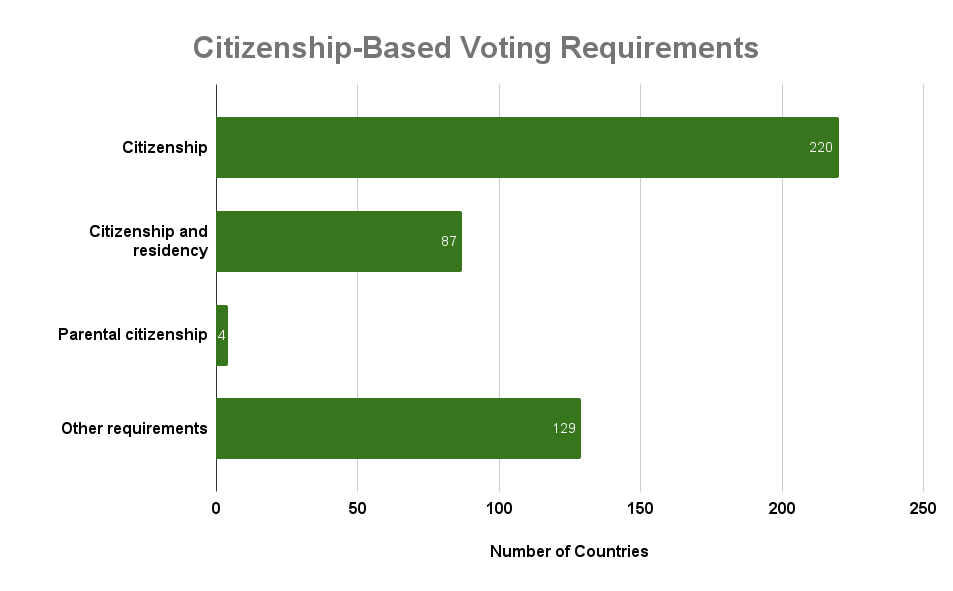3.1 Voting Eligibility Criteria
Around the world, many countries have a set of minimum criteria that must be met for a person to be eligible to vote. Some of the more common criteria are minimum voting ages, citizenship status, and residency requirements (Blais et al., 2001).
Age Requirements
Many countries have a minimum age threshold for participating in elections. Age minimums are also common for accessing other legal rights and entitlements, and they are seen as representative of the competence and maturity required for participation in the civic community. In many countries around the world, the most common minimum voting age is 18 (Blais et al., 2001), although there are some exceptions. Table 3.1.1 compares the legal voting age in several countries.
| Country | Voting Age |
|---|---|
| Brazil | 16 |
| Canada | 18 |
| The United States of America | 18 |
| Cameroon | 20 |
| Taiwan | 20 |
| Singapore | 21 |
Should the voting age be lowered?
While 18 years is a common minimum voting age, several jurisdictions allow voting at the age of 16. In Brazil, voters may cast votes at 16 (ACE Electoral Knowledge Network, n.d.-a). Additionally, twenty American states allow 17-year-olds to cast votes in primary elections for the selection of candidates (Ballotpedia, n.d.-a). In Europe, several countries allow 16-year-olds to vote in European Parliamentary elections (NPR, 2024). Extending the franchise to younger voters might help improve voter turnout; however, some evidence from Austria suggests that younger voters are more inclined to vote for extreme candidates and parties (Bronner & Ifkovits, 2019).
Citizenship Requirements
In addition to age requirements, many countries also enforce residency requirements or citizenship requirements for voting. A citizenship requirement extends the franchise to citizens only. Legal permanent residents, temporary workers, and visiting students are excluded (Blais et al., 2001). There may also be an extension of absentee voting rights to citizens who are living abroad, working abroad, or deployed in the military. Several countries impose additional burdens beyond citizenship, including a minimum period of residence (ACE Electoral Knowledge Network, n.d.-a). Figure 3.1.1 illustrates the different citizenship and residency requirements.

Image Description
Horizontal bar chart titled “Citizenship-Based Voting Requirements”. The chart displays the number of countries with various citizenship-related requirements for voting. The four categories and their corresponding values are:
- Citizenship: 220 countries (longest bar)
- Citizenship and residency: 87 countries
- Parental citizenship: 4 countries (shortest bar)
- Other requirements: 129 countries
The x-axis is labelled “Number of Countries” and has a scale ranging approximately from 0 to 250. Each bar is dark green with the count displayed inside the bar. The overall layout emphasizes that most countries require basic citizenship to vote.
Franchise Restrictions
Over time, there has been a gradual expansion of the right to vote as many countries have adopted a more inclusive approach to the franchise (Blais et al., 2001); however, throughout history, the right to vote was severely restricted. In the next sections, we will examine how voting rights have evolved to be more inclusive.

